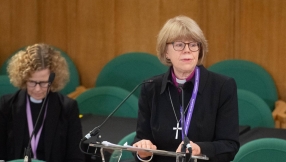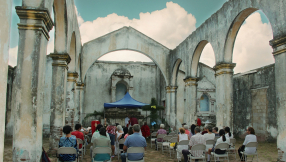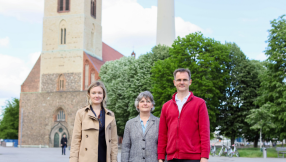Seen from above, volcanic ash paints Chile white
Ash that has reached as far as Argentina continued to spew for a sixth day on Wednesday, disrupting flights to the southern Patagonia region with no sign of a let-up.
"According to experts, the (ash cloud) is less dense, which could indicate a lower probability of it exploding more intensely, but it's just a hypothesis," Sergio Galilea, the top government official in Chile's southern lake region told Reuters during a flight over the erupting volcano.
He said some animals left behind in the ash were confirmed dead. From above, the waters of a fjord that Chaiten sits on and a river were white with ash.
The surprise eruption of the long dormant 3,280-foot (1,000-meter) Chaiten volcano has forced the evacuation within a 30-mile (50-km) radius of the volcano, including more than 4,500 residents of Chaiten six miles (10 km) from it.
Nontheless, distraught residents evacuated from nearby towns say they yearn to return as soon as possible.
"Everything is so uncertain," said Patricio Ide, 40, who was evacuated from the remote village of Chaiten to Puerto Montt, 125 miles (200 km) away from the volcano.
"This could last a month, three months, maybe we can never return. We are so worried," the mechanic said through tears. A coating of ash over 6 inches (15 cm) thick has built up in places and has contaminated ground water supplies.
Chaiten village can only be reached by boat or by air and the navy took people out aboard warships. Given the scale of the natural disaster, the government has not ruled out relocating Chaiten's residents permanently.
After a surge in activity on Tuesday, when the volcano spat hot rocks and lava and the column of ash surged, officials said its two craters had fused, helping ease pressure.
UNCERTAIN FUTURE
But the eruption continued and experts said it would be weeks and possibly even months before residents, who had to leave their belongings, pets and lives behind, could return.
Veterinarians ventured to Chaiten on Wednesday to rescue hungry, thirsty and scared pets, transporting some of them back to Puerto Montt.
Evacuee Maria Angelica Hermosilla said she would go back the first chance she got. "There is nothing like Chaiten," the 42-year-old said. "Everyone knows each other, we are like a big family, there is no violence, no muggings."
The village of Chaiten is nestled by a fjord some 760 miles (1,220 km) south of the Chilean capital Santiago and is a magnet for adventure tourism, fishing and trekking.
Sparsely populated Patagonia is the southernmost swathe of Latin America that cuts across Chile and Argentina and is home to towering snow-capped peaks, some of them volcanoes, glaciers and fjords.
National Emergency Office official Rodrigo Rojas said winds were pushing the vast ash cloud into Argentina, but that it was no longer soaring miles into the air as it did when the eruption started on Friday.
President Michelle Bachelet said it was the first time that Chile has had to evacuate entire towns. The last residents of Futaleufu further east were also being evacuated on Wednesday.
Luis Lara, a government geologist, said he did not expect a catastrophic collapse of the volcano, and said any eventual lava flow would not reach the town. But a cloud of dense, very hot material could coat the surrounding area.
"The activity could continue for quite some time," he said. "It could be weeks, months. It could even be years, but not with the same characteristics - with ups and downs."
Neighboring Argentina canceled flights to Patagonia because of the ash cloud.
In the town of Esquel, one of the worst affected on the Argentine side of the border, the flurry of ash ceased on Wednesday and schools reopened.
But ash continued to fall nearby and officials urged residents to wear facemasks and not to drink from mountain streams - a common practice in the area.
Chile is home to 2,000 volcanoes, 500 of which experts say are potentially active.













